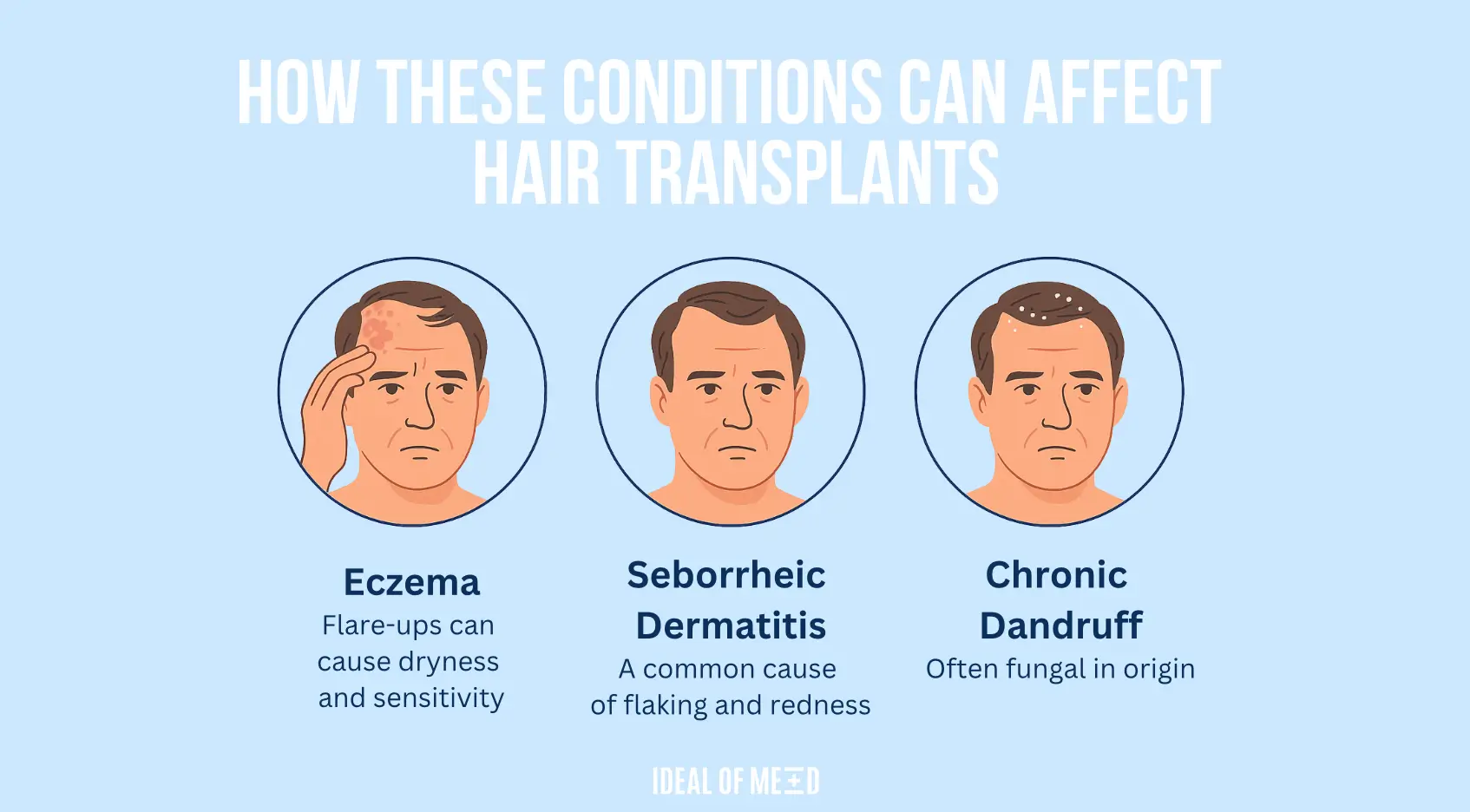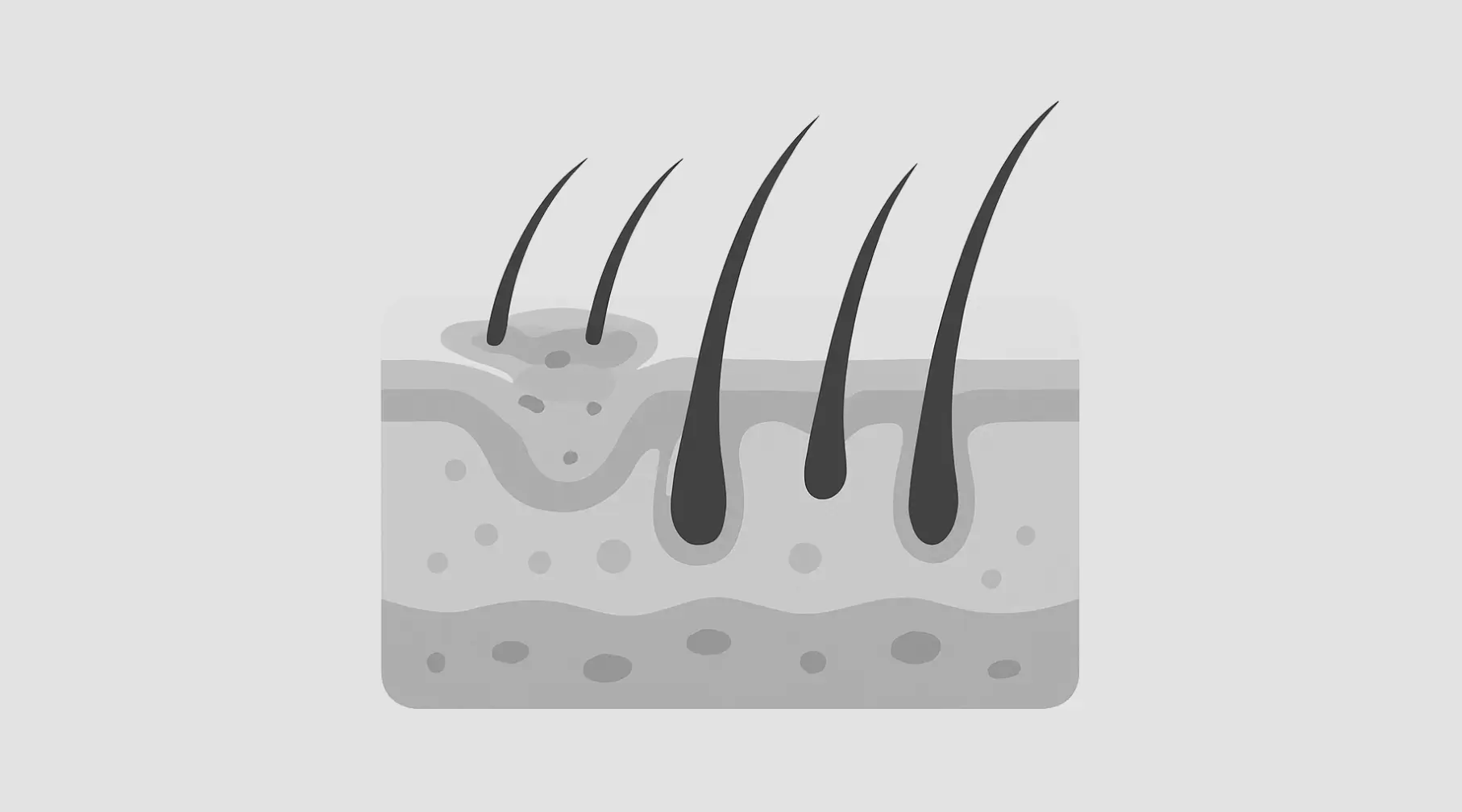Have you ever wondered whether a hair transplant is safe if you have a scalp condition like dandruff, eczema, or psoriasis? Many patients worry their condition might complicate the process. Here’s everything you need to know to make an informed decision — and what Ideal of MeD’s medical team recommends for optimal results.
Skin Conditions and Hair Transplants

If you’re living with a scalp condition like psoriasis, alopecia areata, eczema, or even chronic dandruff, you might be wondering: Is a hair transplant still an option for me? You’re not alone — many patients have the same concerns. The truth is, certain skin conditions can affect whether you’re a good candidate and how well you heal after the procedure.
In this comprehensive guide, we’ll walk you through everything you need to know about how skin and scalp conditions interact with hair transplant procedures. From autoimmune concerns to manageable inflammation, you’ll learn what’s safe, what’s risky, and how to give yourself the best possible chance at a healthy, long-lasting result.
Autoimmune Conditions and Hair Transplants
Conditions like psoriasis and alopecia areata fall under autoimmune diseases — and they are generally not recommended for hair transplants at Ideal of MeD due to the high risk of complications and unpredictable results.
These conditions involve an overactive immune system that attacks healthy skin or hair follicles, leading to chronic inflammation. Performing a hair transplant on an inflamed or unstable scalp not only threatens the success of the procedure but may even trigger flare-ups or further hair loss.
Our stance: At Ideal of MeD, we do not recommend hair transplants for patients with active autoimmune scalp conditions. In rare and mild cases that are fully under control, we may consider a procedure — but only if the patient accepts full responsibility and commits to a serious anti-inflammatory lifestyle protocol.
Eczema, Seborrheic Dermatitis & Dandruff
You can have a hair transplant!

While autoimmune diseases are high‑risk, mild inflammatory scalp conditions such as eczema, seborrheic dermatitis, and chronic dandruff can be managed successfully prior to hair transplant — making you a possible candidate if your condition is stable and not in its peak inflammatory phase.
How These Conditions Can Affect Hair Transplants:
- Eczema: Flare-ups can cause dryness and sensitivity; must be well‑managed to avoid irritation post‑op.
- Seborrheic Dermatitis: A common cause of flaking and redness, this condition must be calmed before surgery to avoid infection and improve graft retention.
- Chronic Dandruff: Often fungal in origin and linked to seborrheic dermatitis; easily treated but must be addressed ahead of surgery.
Preparing for a Hair Transplant
At Ideal of MeD, we assess each patient’s scalp health in‑depth and only proceed with surgery if the inflammation is under control. Post‑transplant flare‑ups can threaten results — which is why lifestyle and scalp care are essential parts of your recovery plan.

Step 1: Dermatologist Evaluation
A complete evaluation will identify any inflammatory or infectious issues. Our team works closely with dermatologists to stabilize your scalp before your procedure.
Step 2: Lifestyle-Based Recommendations
At Ideal of MeD we recommend simple lifestyle changes to support your scalp health. Focus on an anti‑inflammatory diet, cutting out alcohol, quitting smoking, improving sleep hygiene, and reducing stress. These adjustments can enhance the success of your transplant and promote long‑term well‑being.
Step 3: Pre‑Surgery Scalp Care
You’ll receive recommendations for topical products and therapeutic options (such as red light therapy or supplements) to ensure your scalp is clean, calm, and ready for surgery.
MSC Exosome Therapy: Boost Your Results
Ideal of MeD is a leader in regenerative therapies. We offer MSC Exosome Therapy both before and after surgery to accelerate healing, reduce inflammation, and support graft survival — especially important for patients with a history of scalp conditions.
How It Helps:
- Reduces inflammation that could interfere with healing
- Improves immune regulation, especially for borderline cases
- Accelerates skin regeneration for better recovery and stronger hair
What to Expect During Recovery
Patients with sensitive or inflammation-prone scalps should expect a slightly longer recovery, but good results are still possible with the right care:
- Stick to post-op instructions carefully: cleaning, moisturizing, and protecting your scalp are non-negotiable.
- Monitor your scalp daily for redness, irritation, or flaking.
- Continue anti‑inflammatory lifestyle habits — what you eat and how you manage stress can make or break your outcome.
- Follow‑up with our team regularly to ensure optimal graft survival.
Final Thoughts
Hair transplants can be highly effective — but not all scalp conditions are equal. At Ideal of MeD, we do not recommend transplants for autoimmune scalp diseases unless fully stabilized and accompanied by lifestyle transformation.
However, for conditions like seborrheic dermatitis, eczema, and dandruff, surgery may be possible — if inflammation is mild and actively managed. Our integrated approach combines medical expertise, regenerative therapies, and lifestyle optimization to ensure the best possible outcome.
Curious if you’re a candidate? Book your free consultation with Ideal of MeD and let our experts guide you.
FAQ: Skin Conditions and Hair Transplant
Generally no — these autoimmune diseases carry a high risk of transplant failure or disease flare-ups. In very mild, controlled cases, we may evaluate further with full patient responsibility.
Mild eczema, seborrheic dermatitis, and dandruff may be acceptable if not actively inflamed. Lifestyle changes and scalp treatments are still necessary.
You’ll need a dermatological assessment, scalp prep routine, and potentially MSC Exosome therapy or other anti-inflammatory protocols depending on your condition.
MSC Exosome Therapy accelerates healing, reduces inflammation, and boosts graft survival, making it especially beneficial for those with scalp conditions.




